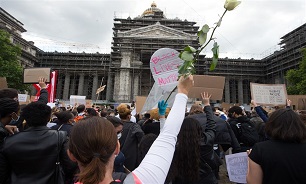 The protest was the latest in a string of demonstrations across Europe inspired by the US movement against racism and police violence. According to the Brussels police, up to 10,000 people were present at Brussels' Place Poelaert, outside the city's Palace of Justice court. The demonstration was not officially permitted, but was "tolerated" by the city of Brussels, a spokesperson for the mayor said beforehand. Prime Minister Sophie Wilmes last week expressed concerns about the demonstration because of the coronavirus pandemic.
The protest was the latest in a string of demonstrations across Europe inspired by the US movement against racism and police violence. According to the Brussels police, up to 10,000 people were present at Brussels' Place Poelaert, outside the city's Palace of Justice court. The demonstration was not officially permitted, but was "tolerated" by the city of Brussels, a spokesperson for the mayor said beforehand. Prime Minister Sophie Wilmes last week expressed concerns about the demonstration because of the coronavirus pandemic.
The vast majority of participants were wearing masks covering their mouths, but because of the massive turnout, social distancing was nearly impossible. Organizers had predicted beforehand that the turnout would be half as much as it was.
But protesters, most dressed in black, said the pandemic would not stop them from coming out in support of George Floyd, a black man, whose death under the knee of a white police officer in the US state of Minnesota has sparked demonstrations worldwide.
"People are respecting the rules to stay safe, which is important," said Anne, 33, who declined to give her last name so as not to be identified by her employer, Politico reported.
"But we want our voices to be heard. I have been living in Brussels my whole life and experienced firsthand that discrimination and police violence for people of color is not just a problem in the United States. Whether it's discrimination to find a house or a job or a house, extra police searches or a different tone when lawmakers talk to you — this is a problem in Belgium as well."
"As a black person, the killing of Floyd touched me because it could have been someone of my family," said 22-year-old student Rachel Buyse. "We also face inequalities here in Belgium." Her friends, who all come from different backgrounds, said they were there to support her.
"For our generation, it makes sense that all people are equal," said 23-year-old Lisa Hitter.
The protest also comes in response to similar complaints about police violence in Belgium, such as the death of 19-year-old Adil of Moroccan descent, who was killed during a police chase in Brussels in April while allegedly fleeing from a police check.
At the end of the demonstration, clashes broke out between some protesters and police, with demonstrators throwing objects like rocks at officers and setting fires to vehicles and garbage cans. Police used water cannons to disperse people.
Other protesters started to loot shops in the nearby high-end shopping area of Louise.
“Damage has been done to various businesses,” a spokesperson for the Brussels police told Belgian newspaper Le Soir.
Protest organizers and Mayor Philippe Close spoke out against the violence on Twitter.
"After the gathering, some troublemakers and delinquents deliberately provoked law enforcement and degraded city property," Close said. "I immediately asked police to disperse the troublemakers and make arrests," he added, saying there were at least 150 arrests.
Close also said that “like other world cities such as Rome, London, Paris or Madrid, Brussels as the capital of more than 400 million Europeans could not remain blind to the global emotion that arose over the death of George Floyd.”
One of many Scrutiny of Belgium's colonial past has also resurfaced amid the protests. Over the past week across the country, various colonial-era icons have been vandalized in protest, especially statues of former King Leopold II, known for his reign of terror in the Congo in the 19th century, when the territory belonged to him personally before it became a Belgian colony. While some statues of him were defaced, others were set on fire or covered in paint and marked with messages saying “I can’t breathe,” the final words of George Floyd.
Similarly, a statue of English slave trader Edward Colston was torn down during an anti-racism protest in Bristol in the South West of England on Sunday. The statue was rolled down to the street before being pushed into the river. The statue has long been a point of contention given the role of Colston’s company in the slave trade from West Africa to the Caribbean and the Americas in the 17th century.
Tens of thousands of Europeans also protested in cities including Madrid and London over the weekend, with a massive crowd gathering outside the UK parliament and the US embassy, despite official warnings to stay away. Health Secretary Matt Hancock said the protests risks spreading the virus. “I will support you in making that argument — but don’t spread this virus which has already done so much damage and which we are starting to get under control,” he told the BBC's Andrew Marr show Sunday.
Police estimate that there were around 15,000 protesters in Berlin's Alexanderplatz, home to the city's iconic TV Tower, many of them dressed in black. And while the Paris police implemented a ban on protests after demonstrations early last week, demonstrators still tried to gather in front of the US embassy.
